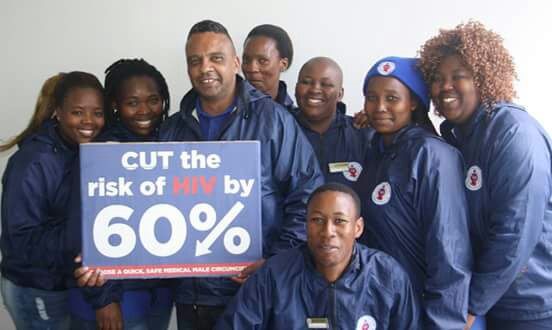TB HIV Care’s Deon Martin, together with a team of 10 mobilisers, enters Manenberg (a suburb on the Cape Flats) once a week to raise awareness around voluntary medical male circumcision (VMMC). They distribute flyers, pin up posters and discuss the benefits of undergoing the VMMC procedure with the community. But all is not as simple as it sounds.
The Cape Flats is an area of Cape Town with a great sense of history and community, however it is also beset with social issues: poverty, high unemployment and gangsterism.
Mobilising Manenberg
To work around the challenges posed by gangs, Deon’s team focus on one section of the community at a time. Martin explains that, ‘Mobilisation on the Cape Flats can be very “tricky” when it comes to gang areas. We need to be aware of the different gangs in the area, identify which gang controls which area – and we need to respect that before even attempting to engage with the community. We go in, mobilise and move out.’
Martin refers to this as ‘guerrilla mobilisation’.
The importance of VMMC
The risks Deon and his team encounter are worth it because of the important message they carry. Not only does VMMC cut the risk of female-to-male HIV transmission by 60%, it also reduces the spread of STIs and is now considered key in preventing cervical cancer in women. So important is VMMC that WHO and UNAIDS have called for significant public health interventions – and set massive targets for priority countries. Targets which the TB HIV Care VMMC team is set on meeting.
The biggest challenge facing the Cape Metro VMMC team is violence between rival gangs – which can break out at any time. ‘It is not always easy to mobilise gangs separately and mistakes do happen,’ says Martin.
Vigilance is key
Martin describes an incident where team members inadvertently crossed into another gang’s territory. Members of one gang were already seated in a shuttle for transport to the local clinic when they were approached by two very young rival gang members with guns. They threatened to shoot all the passengers in the vehicle. Fortunately, the driver took quick action and put his foot flat on the accelerator, swiftly avoiding a very dangerous situation.
For Martin, it is critical to remain vigilant at all times. ‘By vigilant, I mean being observant and aware of your surroundings. You can feel something brewing, such as a rival gang crossing into another gang’s territory. The tension in the atmosphere changes, the ranks of the local community will alter, the body language changes and there is a lot of whispering going on. Subtle things like that.’
Martin and team engage with the community on a Monday, recruiting clients for circumcision on a Wednesday at the Woodstock Community Health Centre. They have been successful in recruiting large numbers in the area and many of their clients are gang members. A total of 402 men were circumcised between October 2015 and September 2016 at the Woodstock facility.
Mobilising separately is ‘number one rule’ for Atlantis
A similar situation is playing out about 66 km north on the West Coast. Here, Gordon Alexander leads a team of 18 mobilisers in the Atlantis area. Alexander echoes the sentiments of Martin, and stresses the importance of mobilising gangs separately. In fact for Alexander, this is ‘the number one rule.’
Alexander remembers an incident where a member of one gang was at the clinic for his follow-up appointment when three rival gang members walked in. They recognised the lone rival gang member and the situation quickly escalated. At first they made verbal threats, but soon showed him their guns. Alexander managed to intervene and ushered him safely out the back door and into a taxi. In previous incidents in the community, this patient had been shot three times by this particular gang. Alexander explained, ‘This was an unusual and unfortunate case as this particular patient had missed his original follow up appointment and under normal circumstances would not have been at the clinic on the same day as the rival gang.’
Door-to-door canvassing
Alexander is on high alert each time he enters Atlantis, ‘On entering an area you don’t need a map, the signs are there. I might not know the area very well but I know gangsterism, which means I know the methods and behaviour of gangsters. When dealing with actual gang members it is essential to discern which member is the leader of the gang as he is the one controlling events. He is usually the quiet one and will stand back and watch. That is the one you need to talk to, as the others follow his orders. Some psychology is used in these instances; you tell them that the mobilisers are service providers who are there to offer a free service that benefits the whole community. It is a psychological game that is being played out. When you provide a service for the community the gangs are actually very appreciative.’
Door-to-door mobilisation is an important part of the VMMC’s strategy. But in these communities, it can be a highly charged situation. At least three members of the team travel together. The strategy is that two members enter the house, while one stays at the door. But, as Alexander says, ‘When there is a war going on you cannot go into the area, or if you are already in the area, you need to leave immediately.’
According to Alexander, mobilisers working in Atlantis or the Cape Flats need to be ‘street wise’, ‘vigilant’, understand their surroundings and ‘never take anything for granted.’
Just another day in the fight against HIV.






